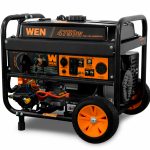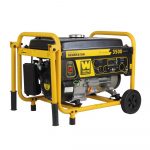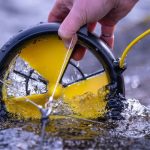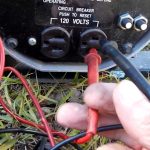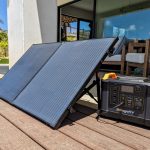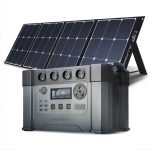A water power generator portable is a device that harnesses the energy of water to generate electricity. This type of generator is a great way to provide electricity without relying on traditional energy sources. It is also more environmentally friendly than burning fossil fuels. The water power generator portable runs on the energy released from water flowing downstream. This energy is converted into electricity which can then be used to power electronics and appliances.
Is there a generator that runs on water? The answer is yes! Water power generators are becoming increasingly popular as a way to generate electricity in remote areas. It is also a great way to provide backup power in case of an emergency. Water power generators are easy to install and require little maintenance. The only downside is that they don’t produce as much electricity as traditional generators. However, they are much more cost-effective and can help reduce your energy costs in the long run. Overall, a water power generator portable is a great way to generate electricity without relying on traditional sources. They are reliable, cost-effective, and easy to maintain. If you’re looking for a way to reduce your energy costs, a water power generator may be the perfect solution.
Can a water wheel power a house?
It uses the natural flow of water to generate electricity, with no need for fossil fuels or other polluting sources of energy. It is a renewable energy source that can be used for a variety of applications. The water wheel power generator involves a wheel that is placed in a stream or river and uses the flow of the water to turn the wheel, which then generates electricity. This electricity is then stored in a battery and can be used to power your home. The main advantage of a water wheel power generator is that it is a renewable energy source that is not only cheaper than other sources but also produces no harmful emissions.
This makes it an attractive choice for those looking for a sustainable form of energy production. The water wheel power generator is also easy to install and maintain. All you need is a wheel, a turbine, and a battery to store the generated electricity. Once installed, the wheel will continue to generate electricity as long as there is water flowing in the stream or river. Overall, a water wheel power generator is a great way to power your home and can help reduce your carbon footprint. It is cost-effective, easy to install and maintain, and produces no harmful emissions.
Is there a generator that uses water instead of fuel?
It uses the power of water for its operation. The generator consists of a turbine-driven alternator and an inlet and outlet water supply. The water flow that is created by the turbine causes the alternator to rotate and generate electricity. The advantages of using a water power generator portable are many. Firstly, it is a clean and renewable energy source that does not release any emissions.
Secondly, it is an efficient and reliable source of energy that can be used even in remote areas. Additionally, water power generator portable is also cost-effective, as it does not require expensive fuels like gasoline or diesel. Water power generators portable are ideal for outdoor activities such as camping, fishing and hiking. They are safe and reliable and can be used in any environment. Furthermore, water power generators are more durable than other portable generators, as they do not need to be refueled as often. Overall, a water power generator portable is a great solution for those who need a reliable, clean and renewable source of energy. It is a cost-effective, efficient and reliable source of energy that can be used in any environment.
Can you power a house with a hydroelectric generator?
This type of generator is portable and easy to install, making it a great alternative to traditional power sources. Hydroelectric generators use the power of flowing water to generate electricity, making them an ideal choice for areas with plentiful sources of running water. They can also be used to power remote areas that don’t have access to a traditional power grid. Hydroelectric generators are typically quite efficient and can provide a reliable source of power for your home. They can also be used in combination with solar or wind energy to create a more sustainable energy solution.
The cost of a water power generator portable can vary depending on the size of the generator and its features. However, they tend to be quite affordable, making them a cost-effective way to power a home. Overall, hydroelectric generators offer a great way to power a home with a water power generator portable at an affordable cost. They are also easy to install, making them an attractive option when it comes to powering a home.
What is a cheaper substitute for hydro power?
It uses the energy of the flowing water to generate electricity. It works by transforming the kinetic energy of the moving water into mechanical energy, which is then converted into electricity. Portable water power generator is an economical and efficient way to produce renewable energy with minimum investment. It is suitable for remote locations as there may not be a grid connection available. Portable water power generators are also safe to use as they don’t have any rotating parts, meaning they are not prone to any mechanical damage. They are also easy to install and maintain, making it an ideal choice for people who need a cheap and efficient source of power.
Is hydroelectric cheaper than solar?
Hydroelectric power is produced by channeling the flow of a river or other body of water through a turbine, which is then used to generate electricity. The cost of installing a hydroelectric power system depends on the size of the generator and the amount of power that needs to be produced. However, the cost of installing a hydroelectric power system is usually much lower than installing solar power systems. This is because hydroelectric power is not exposed to the same fluctuations in sun intensity that solar power systems are. In addition, hydroelectric power is not subjected to the same kind of maintenance requirements that solar power systems require.
This means that it is cheaper to maintain a hydroelectric power system over the long term. This can further reduce the cost of a hydroelectric generator in the long run. Overall, hydroelectric power is much cheaper to install and run than solar power systems. This makes it a great option for those looking to generate their own power in a portable water power generator. It is efficient, reliable, and cost-effective, making it a great choice for anyone looking to generate their own power.
How much power can a small hydro generator produce?
A small water power generator portable can produce a surprising amount of power. Depending on the size and design of the generator, it can generate up to 3.2kW of electricity – enough to power a few lights, small appliances and even a fridge in some cases. These types of generators are often used as a back-up source of power for homes that have experienced a power cut. They are also used in remote locations which have access to a stream or river and no access to the national grid. Using the energy of the flowing water to generate power is an incredibly efficient process.
It produces 100% clean electricity and does not produce any kind of pollutant. This makes it perfect for those who want to be more eco-friendly. The beauty of a small water power generator is that it is portable and can be transported easily. You just need to find a suitable location with access to running water and you can get started. It is a great way to produce your own power, even if it may be limited. Overall, a small water power generator portable is a great option for those who want to produce their own clean and renewable energy. With the right setup, it can generate enough power to meet a large portion of your energy needs.
How much water flow is needed to power a house?
It can produce enough electricity to power your home without relying on traditional sources like the grid or gas-powered generators. To power a house using a water-powered generator, you need to create a water flow. The amount of water flow necessary will depend on the size and power demands of your home. Generally, you need at least a few hundred gallons per minute of water flow to generate enough electricity to power a house. The water for the generator is usually taken from a nearby river or stream.
Pipes and pumps are used to increase the pressure of the water and direct it to the generator. The water passes through the turbines of the generator, which spin and create electricity. Water-powered generators are becoming increasingly popular as an alternative to traditional energy sources. They are relatively easy to install and can generate clean and renewable energy, making them a great choice for powering your home. If you’re looking for an efficient and sustainable way to power your house, a water-powered generator is a great option. With the right water flow, it can generate enough electricity to keep your home running.
What is the best generator for a water wheel?
Water power generators provide an efficient and cost-effective way to generate electricity from a renewable energy source. A water wheel is one of the most commonly used types of water power generators, and it is an ideal choice for people who want to utilize renewable energy sources. When it comes to choosing the best generator for a water wheel, there are a few key factors to consider. The most important of these is the size and power of the generator. The larger and more powerful the generator is, the more efficient it will be at producing electricity.
Additionally, it is important to consider the type of water wheel being used, as different types of water wheels require different generators. Another important factor to consider is the cost. Quality water power generators can be expensive, but they can often pay for themselves over time by providing reliable and cost-effective electricity. It is also important to consider the type of power output the generator produces. Some generators are designed to produce AC power, while others produce DC power. When selecting the best generator for a water wheel, it is also important to consider the environment in which it will be used. Some generators are designed specifically for use in areas with extreme temperatures, while others are designed for use in more mild climates. Furthermore, it is important to consider the maintenance requirements of the generator. Quality generators typically require regular maintenance in order to ensure that they continue to operate at peak efficiency. Finally, it is important to consider the portability of the water power generator. Portable generators are an ideal choice for people who require a generator in areas where it would be difficult to transport a larger, more traditional generator. With a portable generator, it is easy to take it with you wherever you go, making it an ideal choice for those who need a reliable, renewable energy source.
How much electricity could a water wheel generate?
Water power generators are becoming increasingly popular for producing electricity in a sustainable and eco-friendly way. Portable water power generators are a great way to generate energy for small-scale applications. A water wheel is a key component of a water power generator and can generate a significant amount of electricity. Depending on the size of the water wheel, the amount of electricity it can produce can vary significantly. Smaller water wheels, such as those found in a portable water power generator, are likely to generate less electricity than larger water wheels on larger power generators.
The amount of electricity generated by a water wheel also depends upon other factors, such as the speed of the wheel, the elevation and flow of the water, and the type of water wheel itself. The more powerful the flow of water, the more electricity can be generated by the water wheel. A typical water wheel generator can generate up to about 200 watts of electricity, although this can be increased using different methods, such as using multiple water wheels or using a larger wheel. Overall, water wheels provide a reliable and renewable form of power that can be used to generate electricity on a small scale, such as with portable water power generators.
How do you generate a lot of electricity from moving water?
Water power generators can be an effective way to generate a lot of electricity. They use the energy of moving water to turn a turbine and produce electricity. This type of generator is particularly useful for areas with a reliable source of flowing water, such as rivers or streams. Portable water power generators are especially useful for rural areas or for areas with limited access to the power grid. By using the energy of the moving water, these portable generators can generate a lot of electricity in a short amount of time.
The turbines used in these generators are usually made of durable materials that can withstand the forces of moving water and generate maximum power output. Additionally, the generators come with electronic controls to regulate the speed of the turbines and the amount of electricity being generated. These generators are also typically designed to be efficient and cost effective. They are able to generate a large amount of electricity in an efficient manner, which can help reduce operational costs. Overall, water power generators are an effective way to generate a lot of electricity. They are especially useful for areas with a reliable source of flowing water and for those with limited access to the power grid. With their efficient and cost-effective designs, these portable generators can be a great tool for producing a lot of electricity.
How much electricity can a water turbine generate?
It uses the kinetic energy of flowing water to generate power. The amount of electricity that a water turbine can generate depends on the volume and speed of the water, as well as the size of the turbine. Generally, larger turbines can generate more electricity. The water turbine generator is designed to be used outdoors, such as in a stream or river. This makes it a great solution for areas where access to the grid electricity is not available.
The portable water power generator can be used to generate enough electricity to power a small village or an outdoor event. The amount of electricity the water turbine can generate is quite impressive. It can range from a few watts to tens of megawatts depending on the size of the turbine and water flow. By using a larger turbine, it is possible to generate enough electricity to power an entire town. The use of water turbine generator is becoming more popular due to its efficiency and convenience. It is also a great way to reduce carbon emissions by using a renewable source of energy. The water turbine generator is an effective and affordable way to generate electricity and help us reduce our reliance on traditional energy sources.
Why don t we use water turbines?
Water turbines are an efficient way to generate power using the natural energy of water. However, they are not practical for portable water power generators. This is because water turbines need a large amount of water pressure in order to work properly, which can be difficult to achieve in a portable environment. Also, water turbines require a large volume of water in order to generate enough power to be useful. This makes them impractical for portable water power generators since they would need to be filled with large amounts of water in order to function.
Furthermore, water turbines are relatively large and bulky, making them difficult to transport. This is a major disadvantage when it comes to portable water power generators, as the turbines need to be moved from one location to another. In addition, water turbines require a stable water source in order to generate power. This is another issue for portable water power generators, as they need to be able to access a stable water source in order to be useful. For these reasons, water turbines are not a suitable option for portable water power generators. They require too much water and are too large and difficult to transport. Thus, a different method of generating power must be used for portable water power generators.
How much water flow is needed to produce electricity?
It uses the flow of water to turn a turbine and produce electricity. The amount of water flow needed to generate electricity depends on the size and type of water power generator being used. Generally, the more powerful the generator, the greater the water flow rate required. The water flow rate needed for a water power generator can range from very low to very high depending on the type of generator and the amount of electricity it is intended to produce. Generally, a higher flow rate is needed to generate more power.
Low-flow generators may require only a few gallons per minute, while high-flow generators can require hundreds of gallons per minute. It is important to research the required water flow rate before purchasing a water power generator to ensure that it meets your needs. Overall, water power generators can be a great way to generate electricity, provided that you have the right water flow rate. With the right water flow rate, you can generate enough electricity to power your home or other needs.
How much water would it take to power a house?
A water power generator portable could be used to power a house. It is a renewable energy source that uses the energy from flowing water to produce electricity. To calculate how much water it would take to power a house, you would need to consider the size of the house, the wattage of the generator, and the amount of water available from the source. Generally, the larger the house, the more water it will need. The wattage of the generator will influence how much water is required to produce the electricity needed to power the house.
A higher wattage generator will require more water, while a lower wattage generator will require less water. The amount of water available from the source is also an important factor. If the source is a small stream, it will produce less water than a river or lake, and therefore less electricity will be generated. In conclusion, to determine how much water would be necessary to power a house, you must consider the size of the house, the wattage of the generator, and the amount of water available from the source.
What is the best gas powered portable generator?
Unlike a water power generator portable, a gas powered portable generator does not require a water source or installation, allowing it to be used almost anywhere. It also offers more power and capacity than most water powered generators. The best gas powered portable generator should have a number of features, including a reliable and powerful engine, an easy to use control panel, and fuel efficiency. It should also be durable and able to withstand the elements. When selecting the best gas powered portable generator, there are many important factors to consider.
It is important to choose a generator that is the right size and power output for your needs. Additionally, you should consider the fuel type, noise level, and whether the generator has features such as an automatic shutoff in case of overload. Overall, a gas powered portable generator is a great choice for anyone who needs a reliable source of energy. It is easy to transport and install, and offers more power and capacity than most water powered generators. With the right generator, you can be sure to have the power when you need it.
What is the most reliable portable generator?
It provides a safe, clean and efficient form of energy that is powered by water, making it an eco-friendly option. By harnessing the power of moving water such as a river, stream or wave, this type of generator is able to generate electricity that can be used to power your home or business. The most reliable portable generators are those that are designed to be powered by water. They are often built with durable materials and have a long lifespan, making them a great investment. Additionally, they are usually quieter than other generators, making them ideal for camping trips or outdoor events.
The water power generator portable is also incredibly easy to use and maintain. They come in a variety of sizes and can be easily moved around, making them suitable for a variety of purposes. They can provide energy for home appliances and other equipment, making them an ideal choice for those who require additional power. When it comes to purchasing a portable generator, it’s important to select one that is reliable and efficient. Water power generator portable is a great option for those who want to enjoy clean and safe energy without the hassle. It is also incredibly environmentally friendly, making it an ideal choice for those who are looking to reduce their carbon footprint. In conclusion, a water power generator portable is the most reliable choice when it comes to portable generators. It is easy to use, efficient, and environmentally friendly, making it the perfect choice for anyone who needs a reliable and clean energy source.
What s the difference between portable and standby generators?
A standby generator is a larger and more powerful option for your power needs. It is typically much bigger in size and is meant to remain in one place for a much longer period of time. It is more expensive and is more suitable for homeowners and businesses who need an emergency power backup system. The main difference between a portable and standby generator is the size and power output. Portable generators are smaller and generate less power than standby generators.
Portable generators are great for temporary power needs, while standby generators are suitable for more permanent use. Portable generators are usually powered by gasoline or diesel fuel, while standby generators are usually powered by natural gas or propane. Portable generators are also much more affordable than standby generators. Overall, portable and standby generators are two great options for providing power when you need it. Portable generators are ideal for short-term needs and are easy to transport, while standby generators are better for long-term needs and are more powerful.
What are the best portable electric generators?
Portable electric generators are a great way to provide power in a variety of situations. Water power generators offer a reliable and eco-friendly alternative to traditional fuel-powered generators. These generators are designed to convert the energy from flowing water into usable electricity, making them perfect for remote locations and off-the-grid activities. When selecting a portable water power generator, there are a few key features to keep in mind. Look for a generator that is lightweight and easy to transport, and has a large enough capacity to meet your power needs.
It’s also important to consider the type of fuel required, as some generators require more fuel than others. Finally, make sure to read up on the warranty and customer service offered by the manufacturer. Overall, the best portable electric generators are those that are reliable, efficient, and easy to transport. Water power generators provide an eco-friendly and quiet solution, while still supplying the power you need wherever you are. With the right model and careful research, you can find the perfect generator to meet your needs.

